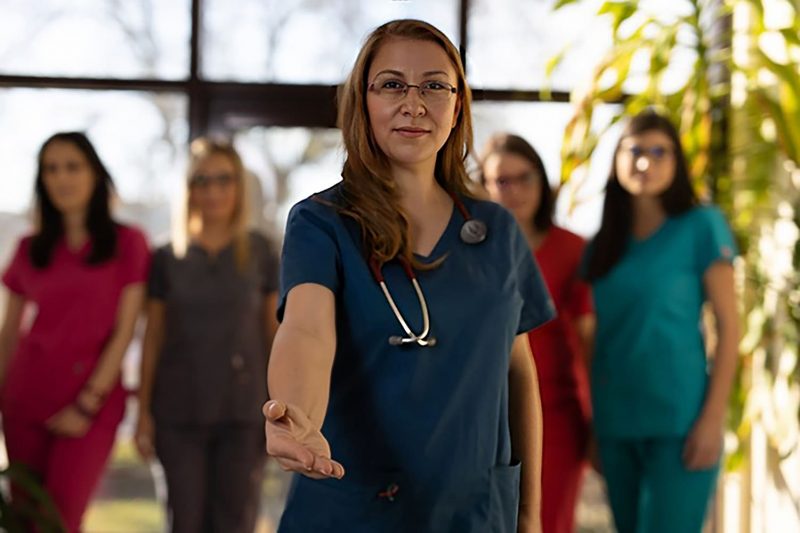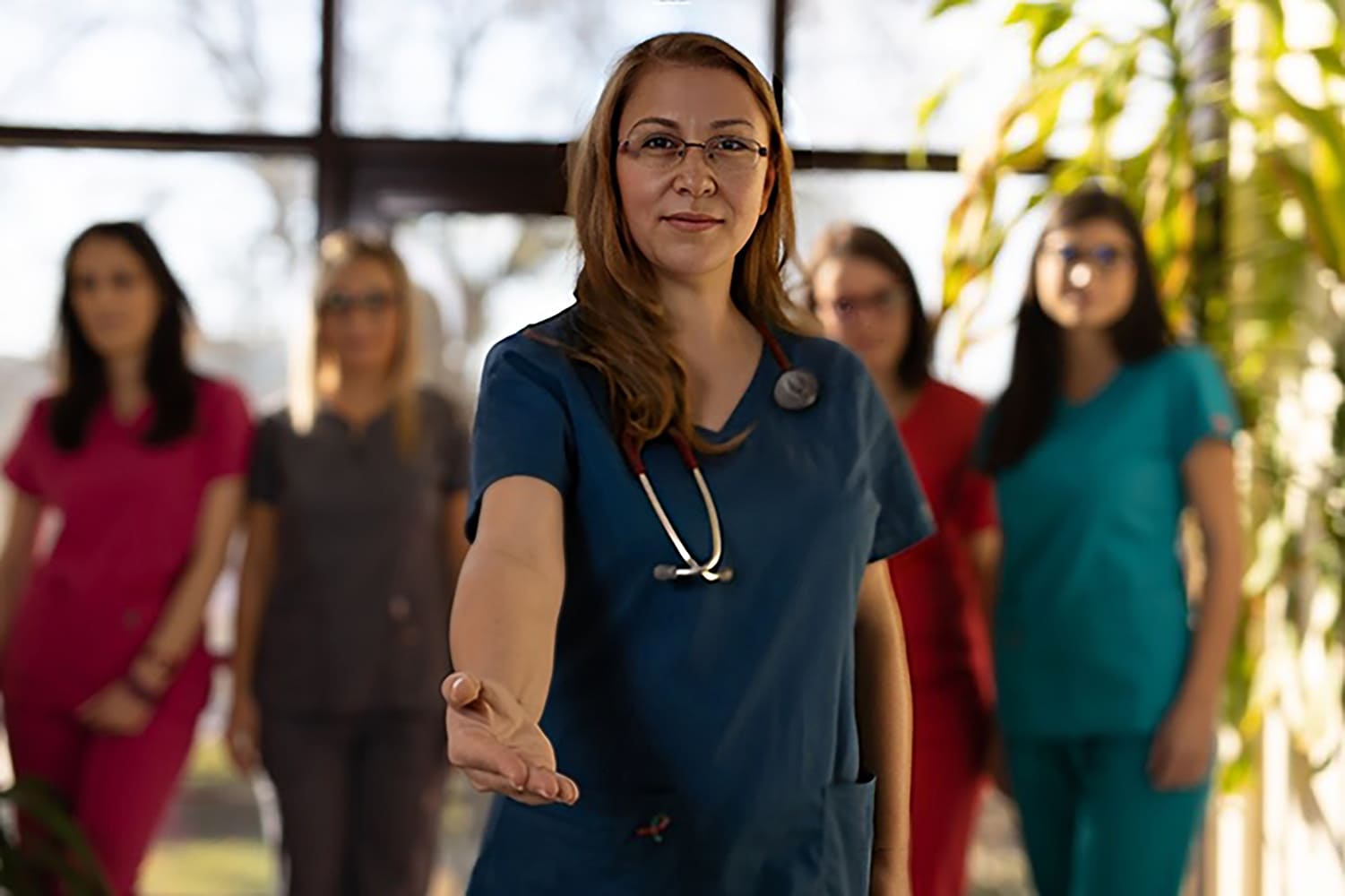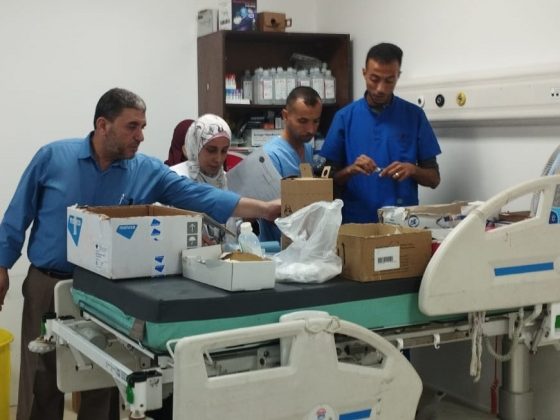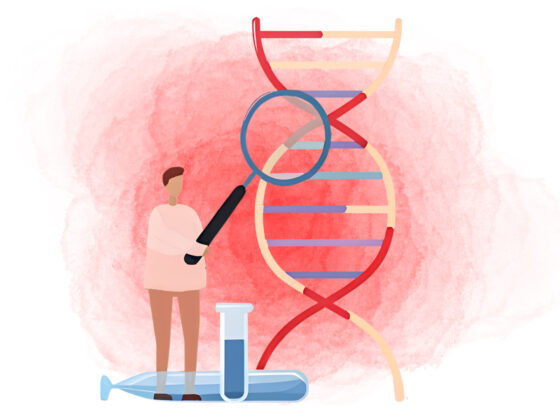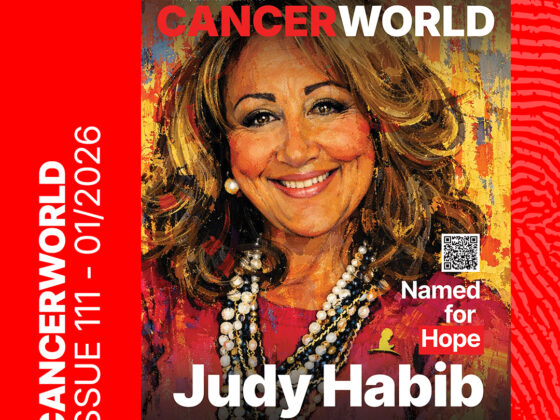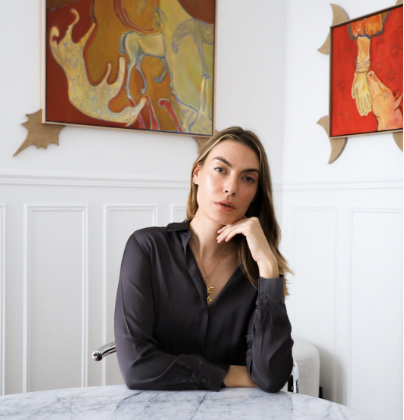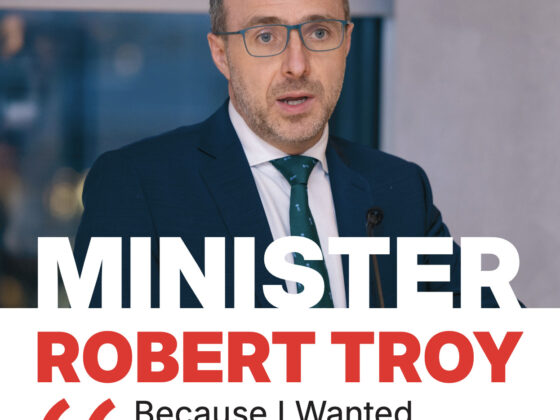It is not about fighting against anything; it is about fighting for the patient. It is this, above all, that motivates Assia Konsoulova to go the extra mile to get the best possible outcome for people who often come to her because they would be ‘written-off’ by other oncologists as hopeless cases. A second motivator is the multidisciplinary dream team that she has managed to create. And the third is her family, because without their support, she would not be able to commit so much time and effort to achieving the outcomes she does.
Her energy and attitude are what make the difference. “We should treat the patient as a human being, and be respectful to them,” says Konsoulova. As an oncologist, her focus is not on ‘the case’, not on the flaws in Bulgaria’s healthcare system, and not on personal gain, but on the person she is there to help.
Now Head of the Medical Oncology Clinic at Bulgaria’s first ever Cancer Centre – formerly the National Oncology Hospital, and recently renamed as the University Specialised Cancer Hospital – she had to find her own path through the sclerotic hierarchies that permeated oncology in post-communist Bulgaria. She did it by working hard, seeking opportunities to learn from the best in Europe, exchanging experiences with others, and listening to those who offered support (her early educational odyssey was described in a previous Cancerworld article on ‘How to become the best oncologist you can be’).
She has now developed a strong and committed team around her – all of them as determined as she is to fight for the best possible outcome, whatever the odds.
Her clinic treats patients with any type of cancer. Having made a name for itself as a place that tackles difficult cases with some success, however, it is now a place for people for whom no one else has an offer, and has become a referral centre for rare cancers such as sarcoma, neuroendocrine tumours and breast cancer in very young and very old patients, and in men.
The number of patients under their care has doubled over the past three years. The team now treats up to 100 patients daily. Konsoulova herself sees up to 20 patients a day, with a focus on breast cancer and some particularly rare tumours and complicated conditions. “We see very difficult cases, often young or very old people. The extremities of life.” These patients are often very complex to treat, requiring a very specific approach to management, or access to specific drugs. “It’s quite a challenge. That’s why I am working at least until 8.00pm every day.”
The multidisciplinary meetings routinely take at least two hours, often three. The challenge is not only about reaching the best decision on how to manage each patient. In Bulgaria, the big challenge is often to ensure the oncology team has enough diagnostic information – histopathology, scans, biomarkers – on which to base that decision, says Konsoulova. The problem stems from a healthcare system that prioritises quantity over quality, she says. Remuneration is based on the number of patients seen, while the quality of treatment is not monitored or evaluated in any way.
This is why many hospitals prefer to treat easier cases, she explains. Internationally accepted standards are not adhered to, including the absolute basics, such as doing a biopsy in breast cancer patients, or conducting a multidisciplinary discussion before therapy. As a result, the patients’ chances of achieving the best possible outcome depends on the one person who treats them. “The system should protect the patient from general mistakes. But it often does not work like this.”
Raising standards
When Konsoulova started in her current position three years ago, fewer than one in ten breast cancer patients underwent a biopsy. “Older surgeons all over Bulgaria see no need to carry out this procedure,” she says. If there is a tumour, they simply do a mastectomy, “to keep the patient safe”.
She started working with younger surgeons to get a biopsy done first, for any patient in whom breast cancer was suspected. When the results showed an aggressive tumour biology, such as luminal B-like cancer, triple-negative or HER2-positive disease, patients would be considered for neoadjuvant treatment. At her current hospital, she’s been focusing on developing standardised pathways for patient care. One result is that, over the three years she’s been there, the number of biopsies in breast cancer lesions increased from fewer than one in ten to eight in ten. Placement of clips and assessment of tumour response is also becoming a baseline consideration. “Those results are very motivating,” she comments, with some satisfaction.
She’s also introduced the sort of patient-centred approach to care that had made a deep impression on her during fellowships and placements at leading European cancer centres. They’ve started to see the difference it makes, she says.
“When you cannot change the system, but you see the water in the desert, you can create an oasis”
When asked about ‘fighting the system’, Konsoulova says that she dropped that years ago, when she realised that her efforts were in vain – one person cannot change a whole system, mentality or policy alone. One of her Bulgarian mentors (a surgeon though, she laughs) showed her a different way. “When you cannot change the system, but you see the water in the desert, you can create an oasis,” he said. Creating an oasis and expanding it is what she is doing right now. The oasis is a little place within the system where she, with her multidisciplinary team, is doing everything on the basis of the latest evidence, tailored to each individual, to maximise the chances of the best possible outcome for the patients.
Establishing a pathway for managing patients with common cancers such as early breast or colon cancer is the first aim. The second is doing the same for patients with advanced, difficult or rare cases. And there are many advanced cancers in Bulgaria, due in part to the lack of any organised population screening programmes. The result is 10–15% higher rates of advanced disease than the European average, and lower survival rates.
An informal network of excellence
Sometimes there is a need for urgent consultation with a doctor from another centre, or examination at another hospital, even outside Sofia. However, there is no institutional collaboration between the many parts of the healthcare system that see cancer patients. Where the system fails, Konsoulova creates it herself. She has built her own personal network with people who share her attitude. When a patient shows up who urgently needs additional tests or medical consultations, she doesn’t – as is common practice – put the onus on them to track down the right people and places, book the appointments, and come back to her when they have the results. She will grab the phone, ask for help and support, and arrange every meeting, additional imaging, or diagnostic procedure that is required, in the correct sequence.
With Konsoulova’s help and good collegial collaboration, a patient can get a diagnosis in weeks; without that it would take several months. “If you leave a patient to the system, it will take time, and they have no time to lose.” So, her team aims to organise each step, contacting whichever specialist is required, so they can quickly proceed with the therapy most likely to achieve the best results.
“You get a network of colleagues you rarely see, but you know that’s the same crazy person who, in the evening, will respond to your call”
It takes time and effort, but the aim is to send patients to experts who are in great demand and hard to access. “You get a network of colleagues you rarely see, but you know that’s the same crazy person who, in the evening, will respond to your call because they work like you.” These colleagues she considers to be exceptionally precious.
Nurturing excellence
With her focus on rare and particularly difficult cases, Konsoulova’s approach is to never give up – it’s about trying every possible option, always digging deeper so as not to miss things of relevance. This is only possible because she has a team of young, motivated people who are keen to follow her lead and who share her philosophy that the patient comes first – “really brilliant people who want to become better oncologists than they are today.”
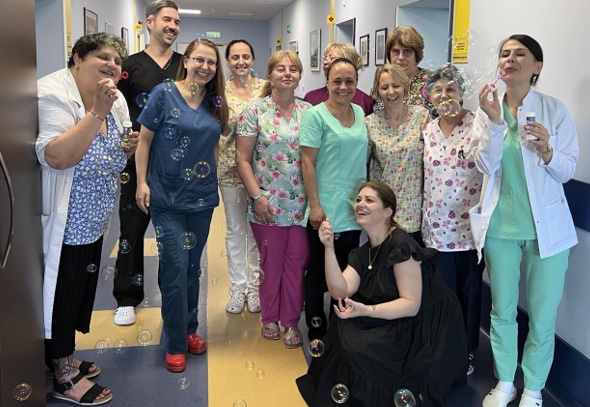
They learn from Konsoulova in the course of their daily practice, and they want to improve themselves further by training in certain specialisms abroad, and bringing back what they have learned. They use this acquired knowledge in their work and pass it on to other colleagues.
It is a quite different approach from what she experienced herself at the beginning of her own career. When she returned to her home institution after a clinical unit placement sponsored by the EU, at the Jules Bordet Institute in Brussels, or her fellowship at the Champalimaud Clinical Centre, Lisbon, sponsored by the European School of Oncology, she heard, “OK you were on vacation in Brussels or in Lisbon. Now you have to work more in order to compensate.” That’s not the attitude she takes with her younger colleagues. Sharing knowledge multiplies it, she says.
“They feel really responsible for bringing back that knowledge and sharing it with others”
Konsoulova encourages her team to be open-minded – reading, thinking, staying updated and motivated to continually improve. It makes her proud when she sees younger people with whom she has been working for some years getting more expert than she is herself in specific areas. “I support them doing that.” She helps her team members to improve their knowledge, skills and experience, finding educational opportunities, facilitating their efforts to apply for a scholarship, a project or research, assisting them with finding a sponsor or writing a motivational letter. It’s about improving as a team. “They are not just happy that they were on a scholarship gaining personal experience, but they feel really responsible for bringing back that knowledge and sharing it with others.”
The opportunity to develop a top team around her is a relatively recent development. Before she started at her position in Sofia, Konsoulova had been working at another large cancer centre, outside the capital. “I had the same knowledge, but without the team of motivated colleagues I was not so influential. Now I am surrounded by people who do not count their phone calls, working hours and efforts, but they get inspired by their results, by complete remissions, and by making a positive difference to the lives of patients and their families. What matters to them is what they achieved, not the effort they put into achieving it.”
The entire team constantly improves and continues their education – so as team leader she has to do that as well. “One of my teachers once said: ‘If you think you are very good at something, you have to reconsider. If you are too comfortable, you start to think that you are the best, and you have to get out of your comfort zone. Otherwise you do not advance.’” You have to feel uncomfortable to be motivated to improve, she says, “otherwise, you are not aiming to be the best, you are not growing, you stay at the same level, while the world does not stop. The world is evolving all the time, so you have to grow with it.”
Konsoulova is recognised among colleagues for being a hard worker and among patients for being a fighter. It’s a reputation that has spread quickly through the ‘bush telegraph’ – where patients pass information to each other over the Internet, directly and in groups. This explains why her patient load has doubled over three years, to the point where is becoming quite hard to manage.
International clinical guidelines are not difficult to find, but there are no national guidelines applied in Bulgaria
The bush telegraph is also where patients get their knowledge of how they should be treated. International clinical guidelines are not difficult to find, but there are no national guidelines applied in Bulgaria, and no requirement for institutions to report on what they do or on their outcomes. Konsoulova and her team try to work according to the guidelines issued by professional bodies such as the US National Comprehensive Cancer Network (NCCN) or the European Society for Medical Oncology (ESMO). Patients who are aware of that are naturally keen to avoid other hospitals and come to them. “People come here because they want professional expertise – they feel grateful for getting something that should be a basic necessity.”
Very often patients will appear at the clinic with their ‘homework’ done. They’ve heard from other patients what diagnostic information is needed – ultrasound, biopsy, histology – and they get it all done, and bring the results to their first appointment with Konsoulova’s team. Some of them even come with results of an MRI scan. It’s a way of showing that they want to cooperate with the doctor and fight, she says.
Joyful wins, painful losses
It can be a difficult battle, because some of the patients who turn up are people who have nowhere else to turn. With an audible smile, Konsoulova recalls patients whose treatments have been successful. Some of them were diagnosed when their first child was just born, and now their children are at university. These are the good examples that give hope to others, and show it’s worth the effort.
“We all have patients with metastatic disease and a life expectancy of a few years who go on to live for 10 or 15 years.” They live because they did what was needed, and not was available in the particular treating institution, she says. “By treating them in accordance with the evidence, in a personalised approach, some of my patients have had 10, 15, 16 lines of therapy, and have achieved complete remissions several times. I have many patients like this.” These stories are an inspiration for the entire team and have to be told and shared, she says. “They give us confidence that, by listening and reading carefully, there will be more stories like that, and we will go forward with the team and the patient together.”
But at a clinic where no-one who asks for advice is rejected, not all stories are success stories. It is still the case in Bulgaria that many families try to protect their loved ones from difficult truths, and keep convincing the patient that everything will be well, even when they have advanced metastatic and incurable disease. Inevitably, in some cases, even the greatest team effort achieves little. It can be disheartening, says Konsoulova, but the team keeps fighting.
“Families often do not remember that the doctor is not the reason if the disease does not respond to the best available treatment – we are not magicians”
“Sometimes I see that the fight will be lost, because the patient has no organ without metastasis. But we give it a try, we do not give up easily.” It’s important to stay close to the facts, the odds, and reality. It is particularly hard when families then blame the doctor for the outcome. “What families often do not remember – the doctor is not the reason if the disease does not respond to the best available treatment,” she says. “Some families have a hard time accepting this. Like a mother of a young patient whose son did not survive a bone cancer. She blamed the doctor, the team, this institution, and not the aggressive disease.”
It can be really devastating for the physician, says Konsoulova, “but we are not magicians”. In those hard moments she counts on her colleagues. “The team supports me by reminding that we are a team, that we all did our best.”
A family balancing act
Her commitment can take a toll on her work–life balance. Once she found her seven-year-old child sleeping, leaning in the hug of his sister, on a bench by her office, while waiting for their mum to deal with an emergency case.
“My child was asleep after school, whereas the patient was sick. He said, ‘Mummy it’s OK,’ she recalls. It wasn’t the only time she prioritised a patient over her family, and she finds these choices very hard. Because her family is always there for her. Her husband is the one who welcomes her home in the evening, glass of water in hand, asking, “Did you drink any water today?” Without their support her work would not happen. “I am always thankful, because I can be who I am because of my family. They help me a lot, so I take a lot of strength from them,” she emphasises.
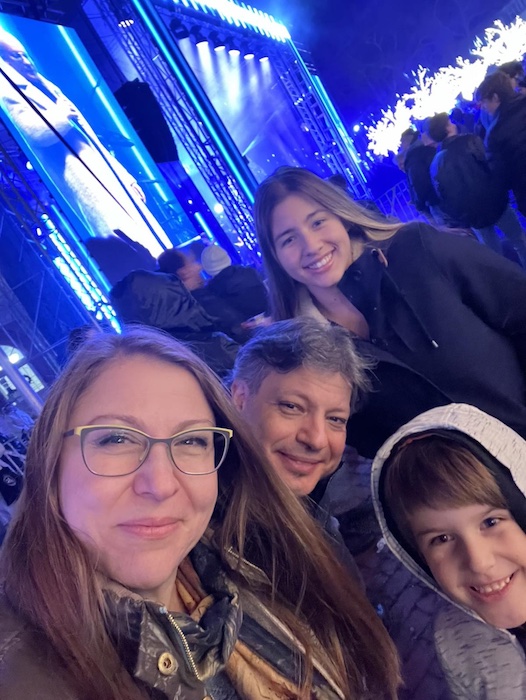
She is painfully aware of the impact it has on them. There is always a ‘because’ explanation – for being late, or missing a school performance or children’s party. And her husband must be a dad and a mum sometimes.
She does her best to spend some time together in the evenings and at some weekends. “I see that they miss their mum. I also miss them a lot. I know I can seem not happy enough about good results at school, because I am too tired after work. I realise that I am a good professional, but I have to be a better wife and mum.” It is reassuring, also, to know that her husband and children are very well aware that she is doing important things, and that they feel they are supporting her in that work, and share the good results and successes. “They are proud,” she says. “I am strong because I have them and they have me!”
More recently, she was welcomed into another – professional – family, having been appointed a faculty member of ESCO, the college of the European School of Oncology, which played an important role in Konsoulova’s own educational journey. The college offers aspiring medical, radiation and surgical oncologists a ‘structured educational pathway’ that spans their careers from medical student through to taking on leadership responsibilities. Its faculty is composed of leading international experts across cancers and disciplines – and Konsoulova is happy to be one of them.
“This is something that will also help me spread good examples, a good way of thinking and working better. I see it not as a reward but as a responsibility, giving me the possibility to work more efficiently, at a more influential level.” It also widens her precious networks of like-minded oncology professionals, “I can contact them and ask how they do some things or ask how I can do something, what can I do better. We are all connected by a phone, online, it’s really making it easier to make better decisions.”
In her mid-career, at the age of 45, she seems very happy, not least because she feels she can sleep well at night, knowing that she’s doing her best for the people who need her expertise.
“I am healthy, I have a great family and wonderful children, I am working in an excellent team of motivated intelligent colleagues. I am getting richer with people, energy, and positive emotions.” Those positive emotions are fuelled whenever she spots other oases of excellence emerging in other parts of the country. It’s a sign that the strategy her mentor advised for improving standards across Bulgaria could be working. The hope is that more and more oases will appear, expand, and work together, until you have a whole system that is geared to deliver consistently high-quality cancer care. “If you have more and more people thinking alike, it will make a critical mass to change the situation in Bulgaria. It might take some time, but it is happening.”

